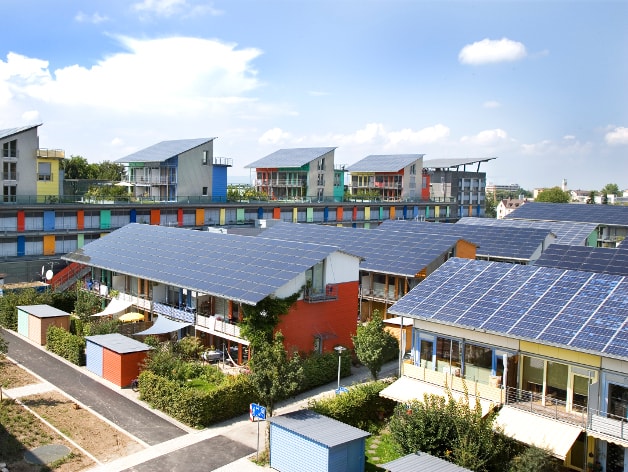Covid 19 and Climate Crisis: It’s time for a Healthy and Sustainable Climate Lifestyle

If the world has seen a scary future with the emergence of COVID-19, the future of our planet in a 3-4° C scenario takes us to an entirely different level of uncertainty concerning environmental safety, in terms of health, economic and social stability.
Covid-19 has tragically revealed the cost and dangers of failing to plan for the inevitable. It could serve as a wake-up call for the need to keep changing our lifestyle and initiate a fast and robust response and created adaptation to the climate crisis already present. The dangers of climate change are already becoming real — like unprecedented devastating fires throughout California and Australia.
There can be no return to “business as usual” in the aftermath of these crises if humanity is to escape catastrophic climate breakdown.
These crises could help us to implement a more resilient, healthy and sustainable lifestyle. We must work on all levels: the individual, social, economic and governmental together to curb the progression of climate change before it is too late. We must begin flattening the curve of climate change now. As individuals and community, we need to invest in strategies creatively and passionately to prevent more death and destruction and to protect life on earth.
What we need is a very different kind of lifestyle and a transformed economy if we are to build a socially just and ecologically sound future. In the face of Covid-19, this has never been more obvious.
Our response, our willingness to change now will determine our quality of life and that of future generations. Join us! The steps we’ve outlined in 350 Marin’s Healthy Climate Lifestyle program will guide a path to change our way and establish a new normal – one that is greener, healthier, more just, resilient, sustainable and respectful to the nature we are part of and dependent on.
Climate change cannot be solved by any one person, but starts with you and me. Everyone is essential. Every action has an impact. It’s all hands on deck.
For questions or suggestions contact: Silke Valentine: silkevalentine1@gmail.com
1. Switch to Clean Energy, Go Deep Green
Sign up for MCE’s Deep Green Option and eliminate your carbon footprint for $5 a month here.
2. Move Your Money Where Your Heart Is
Pull your money out of banks that fund these industries.
Move your money into region and community supportive investors, credit unions banks and green stocks. Invest in climate/environmental/social justice/community conscious projects.
Support local small businesses, donate to environmental causes.
https://www.ran.org/bankingonclimatechange2019/
https://fossilfreefunds.org/, https://www.GoFossilFree.org,
https://www.fossilfreeca.org, https://californiapublicbankingalliance.org/
https://350marin.org/divest_invest-350/
3. Be Climate-Wise About Transportation
Reduce product transportation and support your community by buying seasonally grown foods from local farmers and producers.
Shop at farmers markets.
Avoid on-line purchases when possible (reduce shipping via Amazon and other deliveries).
Drive energy efficiently: plan smart shopping, reduce speed, proper tire pressure.
Buy electric cars/bicycle and walk more, use public transportations, carpool, share a car.
Take vacations locally, reduce air travel.
Drive an electric car. https://drivecleanmarin.org/
http://www.saferoutestoschools.org/, https://511.org/
4. Go Zero Waste and Zero Toxins. Stop Plastic Consumption and Pollution
Reject, Reduce, Re-use, Recycle plastics whenever possible.
Avoid buying plastic wrapped products, buy fresh or food in glass and cans instead.
Buy in bulk, bring your own reusable containers to grocery stores for packaging
Reuse plastic bags, stop using new plastic wrapping.
Inform yourself about additives in the products you buy, avoid toxic chemicals.
https://www.plasticpollutioncoalition.org/
https://www.facebook.com/Pesticide-Free-Marin-990814910952188/
5. Consume and Shop Less. Buy only what you really need
Spend quality time with family, friends and community, animals, nature.
Exercise and engage in fun, creative activities instead of consuming and spending as much.
6. Buy and Use Ethnical, Sustainable and Nontoxic Produced Products, Shop Second Hand
Become aware of products made of fossil fuel, petrol chemicals, plastic and avoid them when possible.
Switch to buying high standard sustainable/ethnical produced/non toxic products, (safe for workers, for you, your family and the environment that are made without toxic chemicals or fossil fuels)
Buy locally produced products.
https://whgbetc.com/petro-products.pdf
Shop second hand. Organize or participate in close exchange transactions like Craigslist, garage sales etc.
7. Eat a Climate Diet
Eat low on the food chain (more veggies/fruits, less or no meat/ dairy/animal protein).
https://350marin.org/climate_diet_team/
Buy locally-produced food, go to farmers markets.
Support healthy, sustainable farming practices. Buy food organic grown, pesticide and GMO free, foods that are certified as fair trade and produced so as to ensure worker and animal care.
Avoid supporting fast food restaurants and chains, and instead, eat at local community-oriented restaurants. Use reusable plates, silverware, napkins, tupperware rather than disposables. (Including when you get foodto-go!)
Reduce food waste.
http://www.stopwaste.org/at-home/reducing-wasted-food/wasted-food-facts
Throw biodegradable waste or compostable materials in the green bin
8. Make your Garden and Property Environmentally Friendly, and a Carbon Sink
Promote healthy soil and plant bee, butterfly, and bird friendly plants.
Stop using pesticides or chemical fertilizer.
Grow your own food in your garden, in pots. Join community gardens.
Establish composts and worm bins. Plant and protect trees.
9. Live, Remodel and Build in an Energy Efficient and Eco Friendly Way
Remember to turn off your lights whenever they’re not needed, especially during the day.
Put stereos and electronics on power strips and turn them off when not in use.
Replace your incandescent light bulbs with with very low energy compact LEDs.
In the winter, turn down the thermostat, and wear warmer cloths instead.
In the summer, avoid using the air conditioner. Consider getting an evaporative cooler.
Turn down the temperature on your water heater (130 degrees is hot enough).
Use rechargeable batteries instead of disposable batteries for portable devices.
Minimize printing documents from the computer – go paperless.
Use non-toxic, environmentally-friendly products for cleaning.
Use rags and hand-towels instead of paper towels or napkins.
Minimize use of aerosols. Don’t buy them if halons or CFC’s are listed.
Line-dry clothes inside or outside to save energy/sustainable for textile fibers and give your clothes a fresh smell.
Replace gas or propane with clean electric energy. Install solar panels.
Remodel and built with eco- friendly materials, good insulation. Buy energy efficient appliances.
https://www.marinenergywatch.org
http://www.gosolarcalifornia.org
https://gettingtozeroforum.org/residential-resources/
10. Save Our Precious Fresh Water Resources
Conserving indoor water in general
- Eat proteins that save water.
- Conserve water in household uses.
- Check your plumbing for leaks, especially leaking toilets and faucets.
- Install low-flow shower heads and faucets. Use faucet aerators.
Conserving water in the laundry and kitchen
- Lower water flow when washing food or dishes.
- Use your garbage disposal sparingly.
- Wash full laundry and dish loads.
- Do less laundry.
- Replace your clothes washing machine with a high-efficiency washer.
Conserving water in the bathroom
- Cut your shower time (5 minutes) or take one fewer showers per week.
- Turn off the water while shampooing or washing your body.
- Turn off the water while you are brushing your teeth or shaving.
- Convert your toilet to low flush.
- Get or create a dual-flush toilet.
Conserving water outdoors
- Care for your lawn in a more water-efficient manner. Plants that need less water.
- Use mulch on your garden to retain moisture.
- Use wastewater or gray water from the bath, washing machines or dish washing for the garden.
- Collect rain water and use it to water plants in the garden.
https://www.marinwater.org/136/Conservation
https://www.nmwd.com/conservation.php
11. Inform, Discuss, Inspire, Engage, Promote Change for the Good of All. Vote for the Green New Deal (Green Politicians)
Talk about climate crisis, climate justice and healthy lifestyle options with family, friends, neighbors. Become a climate and environmental activist. Join the climate action/justice movement, Engage in local groups, campaigns, strikes, marches, rallies. Support the rights of nature, youth and indigenous peoples. Vote!
https://www.facebook.com/SunriseMovementMarin/
https://www.350Marin.org , https://www.sierraclub.org/san-francisco-bay/marin
https://www.greenchange.net/, https://www.drawdown.org/, https://www.marincounty.org/depts/cd/divisions/sustainability/climate-and-adaptation/drawdown-marin, https://www.sustainablemarin.org/
https://www.resilientneighborhoods.org/, https://www.marinefm.org/
